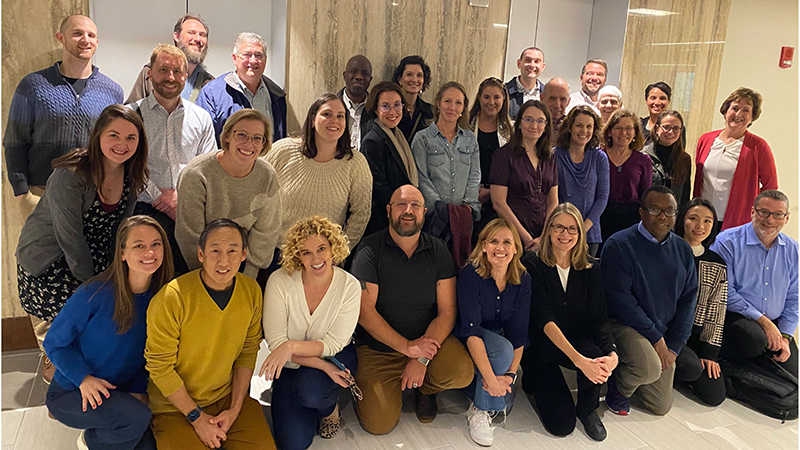
In the landscape of American healthcare, Medicaid stands as a fundamental pillar, catering to over 81 million individuals and serving as a crucial safety net for healthcare needs. However, extracting valuable insights from Medicaid data across different states has been hindered by various obstacles. The Medicaid Outcomes Distributed Research Network (MODRN) began in 2017, and has emerged as a collaborative initiative across states, addressing these barriers to enable robust data analysis and facilitate learning among Medicaid agencies around the country.
Dushka Crane, PhD, LSSBB, serves as the Director of Behavioral Health at the Ohio Colleges of Medicine Government Resource Center and a key participant in this MODRN program, emphasizes its significance, stating, "MODRN fosters a collaborative environment where states can pool resources and knowledge, enabling evidence-based policy insights that positively impact the healthcare experiences of millions."
Since its inception in 2017, the Ohio Colleges of Medicine Government Resource Center has actively participated in MODRN, recognizing its potential to revolutionize healthcare policy through data-driven insights. The collaborative effort involves AcademyHealth's State-University Partnership Learning Network (SUPLN) and the Medicaid Medical Director Network (MMDN), jointly developing MODRN to empower states to conduct crucial multi-state data analyses while maintaining control over their respective data and analytical capabilities.
At its core, the MODRN model operates on the premise of efficient, high-quality analyses of multiple states’ Medicaid data while ensuring stringent security measures for sensitive health information. It utilizes a distributed research network framework, where each state-university partnership adopts the Medicaid Common Data Model and contributes to a unified analytic plan. The analyses are executed locally using standardized code developed by the data coordinating center. Subsequently, aggregate results—not raw data—are shared with the data coordinating center for synthesis, ensuring confidentiality and privacy while maximizing collaborative insights.
Gilbert Liu, MD, MS, Ohio Colleges of Medicine Government Resource Center Medical Director, underlines the critical importance of this program in healthcare advancement, stating, “MODRN has significantly improved the delivery of healthcare to patients experiencing substance use disorder. For example, MODRN has identified more effective targets to sustain adherence to medication assisted treatment, disparities that need to be addressed so that minority subgroups experience more equitable care, and emerging policy successes that can be adopted by states to reduce opioid overdose deaths.”
Through standardized and efficient analyses, invaluable benchmarks that allow states to gauge progress and glean insights from policy variations have been revealed. The significance of utilizing data from fourteen states instead of just one has become apparent in the quest to understand issues and devise solutions. Discoveries have highlighted extensive disparities in opioid use disorder treatment between states and even within them. Among these revelations, certain treatment patterns, notably the consistency in care provision, have emerged as robustly linked to positive public health outcomes. This nuanced understanding underscores the intricate nature of addressing these challenges and the importance of comprehensive approaches in healthcare policies.
MODRN initiates various programs aimed at addressing key healthcare challenges, including examining opioid use disorder treatment, assessing non-opioid substance use disorder treatments, and evaluating the impact of state delivery system reforms on racial and ethnic disparities in access to medications for opioid use disorder. These initiatives highlight MODRN's diverse scope and its commitment to addressing pressing healthcare concerns.
AcademyHealth's Evidence-Informed State Health Policy Institute provides essential support through the management of MODRN's Coordinating Center, overseeing governance structures, facilitating communication with fourteen state members, and ensuring efficient functioning across all research projects within MODRN.
MODRN stands as a pioneering initiative reshaping Medicaid-based healthcare by facilitating data-driven decision-making, fostering collaborations among states, and enabling evidence-based policy formulations. Its decentralized approach ensures data security while maximizing collective insights, propelling healthcare towards a future centered on improved patient experiences, population health enhancement, and reduced healthcare costs.
"Witnessing the cohesion among leaders from the Ohio Colleges of Medicine Government Resource Center and counterparts across states at the AAMC's esteemed headquarters during SUPLN's Fall 2023 conference is truly inspiring. This collaborative endeavor signifies a substantial leap toward evidence-based state health policy, driving transformative shifts in Medicaid healthcare," expressed Lorin Ranbom, Director of the Ohio Colleges of Medicine Government Resource Center.
MODRN's impact extends far beyond its individual programs, serving as a catalyst for transformative healthcare policies guided by rigorous research, collaboration, and evidence-based decision-making.
Moving ahead, MODRN’s initial project was centered on opioid use disorder (OUD); however, the tools and methodologies developed possess the adaptability to address a wide array of Medicaid-related concerns. Presently, the group is utilizing a NIDA grant to delve into understanding and addressing the disparities in how individuals of different racial backgrounds receive treatment for OUD from healthcare providers. Additionally, they have submitted a proposal to NIDA, awaiting review, which aims to establish criteria for evaluating healthcare providers' quality and initiate a pilot program in Ohio to enhance treatment approaches. Their upcoming steps involve leveraging these opportunities to gain deeper insights into and address racial disparities effectively, while striving to ensure equitable and high-quality treatment for all.

